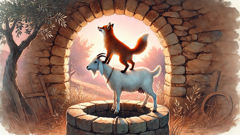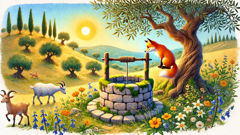Introduction
Beneath the endless blue of a Grecian sky, where olive groves stretched toward the horizon and the air shimmered with the warmth of the Mediterranean sun, there lay a small, timeworn village. Its stone cottages clustered on a gentle hillside, their red-tiled roofs glowing in the afternoon light. Wild thyme and oregano perfumed the breeze, cicadas sang their endless chorus, and on the outskirts, the countryside unfolded in a patchwork of golden meadows, rocky outcrops, and lush green thickets. Here, in the embrace of nature’s bounty, creatures both wild and tame found sanctuary. Foxes darted through tangled undergrowth, goats grazed contentedly among the scattered stones, and shepherds guided their flocks along winding, ancient paths. Life in this corner of Greece moved at the gentle pace of seasons, where wisdom was measured in stories passed from mouth to ear over generations. Among these tales, none held such sway as the fable of the fox and the goat—a story born of the land’s very dust and carried on the lips of elders as a warning and a lesson. It was a tale of quick wits and trusting hearts, of choices made in haste and their lasting consequences. For here, among dappled shade and sunlit fields, every creature knew the value of caution—save, perhaps, for one clever fox and one unsuspecting goat, whose encounter by a forgotten well would echo through the ages as a timeless lesson: to look before you leap.
The Thirsty Fox and the Forgotten Well
The day had begun as any other for Lysandros, the fox. Nimble and quick-witted, he was known throughout the hills for his sharp mind and sharper appetite. That summer, the land had grown dry. The river trickled, the grasses wilted, and water became a treasure sought by every living soul. Lysandros, parched from the relentless sun, prowled the thickets in search of a cool sip. He sniffed the earth, nosed among dew-dappled leaves at dawn, but found nothing to quench his thirst. With each passing hour, his mouth grew drier, his tongue heavy in his jaws, until he came upon the oldest well in the valley—a relic, half-hidden by tangled vines and heavy with the scent of moss and stone.

This well had stood since the memory of the oldest trees, its rim worn smooth by centuries of hands drawing water. Lysandros circled it warily. He peered into the darkness, saw the faint glimmer of water far below. Desperation overrode caution. He clambered atop the rim, braced his paws against the slippery stone, and peered over the edge. For a moment he hesitated, recalling stories of animals trapped by their own impatience. Yet thirst drove him onward. With a reckless leap, he descended into the cool shadow and landed with a splash at the bottom of the well.
The water was sweet and cold—a balm to his parched throat. Lysandros drank deeply, savoring each drop. But as his thirst faded, a new dread settled in his chest. The walls of the well rose high and smooth, their stones too slick for his claws to grip. The rim was impossibly far above. He leaped, scrambled, and slid back into the chilly pool. Panic threatened to overtake him, but years of cunning had taught him that fear seldom served a fox well. He settled in the darkness, eyes lifted to the narrow circle of daylight, ears tuned for the sound of rescue or opportunity.
Hours passed as shadows drifted across the mouth of the well. Birds wheeled overhead, their wings casting fleeting silhouettes on the water’s surface. Lysandros’s mind turned and twisted, searching for an escape. He tried to charm a passing beetle into fetching help, but it only scuttled away. He considered calling for aid—though what animal would risk their own safety for a fox, much less one with a reputation for trickery? Then, as dusk painted the sky in shades of gold and rose, he heard the soft clop of hooves and a gentle bleat. Hope flickered anew. Peering up, he glimpsed a pair of curious eyes and two pointed ears outlined against the fading light.
The Trusting Goat’s Arrival
The goat’s name was Melia—a gentle soul with a white coat speckled like morning clouds. She belonged to an old goatherd who prized her above all for her calm spirit and curious nature. Melia had wandered from her flock in search of wild herbs, her nose leading her along winding trails, through thickets fragrant with thyme and rosemary, until she found herself at the edge of the ancient well.

Melia paused, ears flicking. She heard a faint echo—a soft, rhythmic splashing and a voice calling up from below. It was Lysandros, who wasted no time weaving a tale to suit his need.
“Ah, friend Goat!” he called, his voice floating up with practiced warmth. “What fortune that you’ve come! Down here the water is sweeter than nectar, cool as a mountain spring. On a day like this, what could be better than a long, refreshing drink?”
Melia peered down, her brown eyes gentle and trusting. She saw Lysandros standing amid the water, looking quite at ease. The goat’s own thirst was not pressing, but the suggestion of such delightful water was hard to resist. She considered for a moment—the fox seemed at ease, and she could see no danger. The well was deep, but if Lysandros was down there and safe, surely she would be too.
“Is it truly so wonderful?” Melia called down.
“The best you’ll ever taste,” Lysandros replied. “Why not come down and see for yourself? There’s plenty for us both!”
Trusting in the fox’s words—and perhaps eager for adventure—Melia planted her hooves on the crumbling rim, took one last look at the world above, and leapt into the cool shadows below.
She landed with a gentle splash beside Lysandros, who greeted her with feigned delight. The water was indeed refreshing, and for a brief moment, Melia felt she’d made the right choice. But as she drank, she noticed how smooth and high the walls rose above her. She tried to leap up, her hooves scrabbling against damp stone, but the top was far beyond her reach. Panic fluttered in her chest.
“Fox, how do we get out?” she asked, voice trembling.
Lysandros’s eyes glinted with cunning as he pressed his plan into motion. “Fear not, dear Melia,” he soothed. “Between the two of us, surely we can find a way. Let me think.”
As the stars began to prick the sky and cool air settled into the well, Melia and Lysandros stood together—one innocent, one scheming—each contemplating their fate at the bottom of the ancient well.
Cunning and Folly: The Fox’s Escape
Night descended, blanketing the land in cool tranquility. Within the well, Lysandros’s mind worked like a millstone—grinding, weighing, spinning tales. Melia paced, growing anxious as she realized their predicament. The moon rose high, casting silvery beams down the narrow shaft. The water shimmered with reflected starlight, and above them, the world was hushed save for the distant baying of hounds and the gentle rustle of olive leaves.

Lysandros broke the silence with a sigh, feigning thoughtful concern. “Melia, you are strong—your back broad and steady. If you stand tall and brace your legs, I could climb upon your shoulders and leap to the rim. Once I am out, I’ll find a rope or call for help, and soon you’ll be free as well.”
Melia’s eyes brightened with hope. She trusted the fox’s cleverness and believed in his promise. “Of course, Lysandros! Stand on my back if it will help us both.”
With practiced grace, Lysandros waded over. Melia knelt beside the wall, bracing herself as best she could. The fox scrambled up her back, his claws digging gently into her thick fur. He sprang from her shoulders, stretching toward the rim. His paws caught the stone edge, and with a final burst of effort he pulled himself up, out of the well and into the cool night air.
For a moment, Melia waited, her heart pounding. She listened for the sound of help or the toss of a rope. Instead, she heard Lysandros’s voice drifting down from above—changed now, free from pretense.
“Dear Melia,” he called, “you should have thought how to get out before you jumped in. A wise creature always looks before she leaps.”
The words stung. Melia realized she had been tricked—not out of cruelty, but out of desperation and cunning. Lysandros disappeared into the night, his silhouette darting between olive trees. Melia was left alone in the cool darkness, regret blooming where trust had once lived.
But Melia was no ordinary goat. She knew her own strength and courage. Rather than give in to despair, she looked up at the stars and thought deeply on her predicament. She called softly for help, and in time, a shepherd’s boy—searching for his lost goat—heard her voice echoing from the well. He gathered friends from the village, and together they lowered a sturdy rope, rescuing Melia as dawn painted the sky in gentle hues of pink and gold.
Melia emerged from the well changed. She understood now the value of caution and the importance of questioning before trusting blindly. She returned to her flock wiser and more watchful, her tale spreading through the hills as a gentle warning to all.
Conclusion
Long after the sun rose and set again over the Greek hills, the tale of Lysandros and Melia lingered in the hearts of all who heard it. The fox’s cleverness was admired, yet his lack of kindness was met with quiet disapproval. The goat’s innocence served as a reminder that trust and caution must walk hand in hand. In the cool evenings, as elders gathered by flickering lanterns to share stories beneath the olive trees, children would sit wide-eyed while the lesson was repeated: never jump into a situation without first thinking how to get out. Life in those ancient hills was shaped by wit and wisdom alike. Every well, every shaded grove, every crossroads whispered its own story of choices made—some wise, some foolish. Melia’s tale became a gentle warning not just for goats and foxes, but for all who walk paths where trust and danger can be difficult to tell apart. The well stood still as ever at the meadow’s edge, its stones warmed by sun and softened by moss, a silent witness to folly and cunning. And in time, Melia herself grew old and wise, beloved by her herd and remembered not just for her mistake, but for her courage to learn from it and warn others. In this way, the fable’s lesson endured: wisdom lies not just in cleverness, but in careful thought and quiet reflection before every leap.













